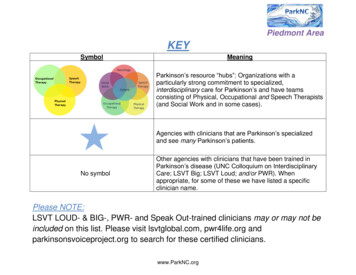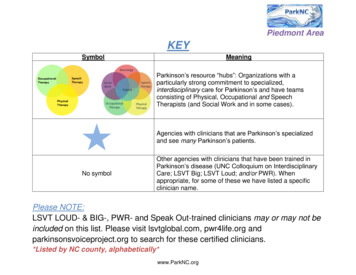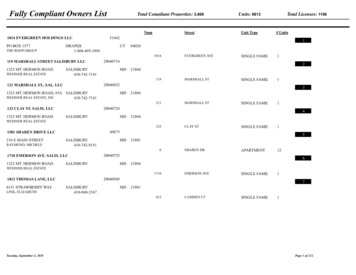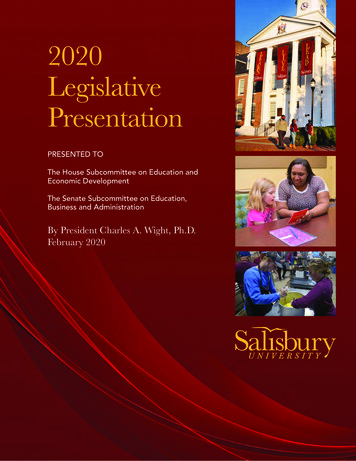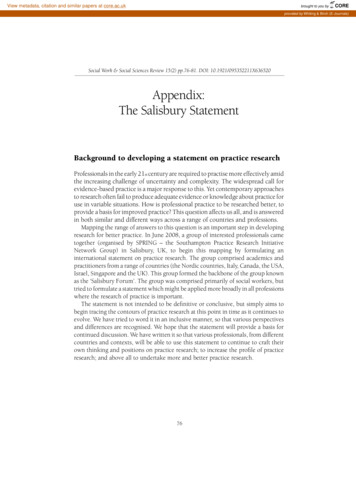
Transcription
View metadata, citation and similar papers at core.ac.ukbrought to you byCOREprovided by Whiting & Birch (E-Journals)SALISBURYSTATEMENTSocial Work & Social SciencesTHEReview15(2) pp.76-81.DOI: 10.1921/095352211X636520Appendix:The Salisbury StatementBackground to developing a statement on practice researchProfessionals in the early 21st century are required to practise more effectively amidthe increasing challenge of uncertainty and complexity. The widespread call forevidence-based practice is a major response to this. Yet contemporary approachesto research often fail to produce adequate evidence or knowledge about practice foruse in variable situations. How is professional practice to be researched better, toprovide a basis for improved practice? This question affects us all, and is answeredin both similar and different ways across a range of countries and professions.Mapping the range of answers to this question is an important step in developingresearch for better practice. In June 2008, a group of interested professionals cametogether (organised by SPRING – the Southampton Practice Research InitiativeNetwork Group) in Salisbury, UK, to begin this mapping by formulating aninternational statement on practice research. The group comprised academics andpractitioners from a range of countries (the Nordic countries, Italy, Canada, the USA,Israel, Singapore and the UK). This group formed the backbone of the group knownas the ‘Salisbury Forum’. The group was comprised primarily of social workers, buttried to formulate a statement which might be applied more broadly in all professionswhere the research of practice is important.The statement is not intended to be definitive or conclusive, but simply aims tobegin tracing the contours of practice research at this point in time as it continues toevolve. We have tried to word it in an inclusive manner, so that various perspectivesand differences are recognised. We hope that the statement will provide a basis forcontinued discussion. We have written it so that various professionals, from differentcountries and contexts, will be able to use this statement to continue to craft theirown thinking and positions on practice research; to increase the profile of practiceresearch; and above all to undertake more and better practice research.76
THE SALISBURY STATEMENTPractice Research: The Salisbury StatementPractice research: why is it important and why now?The current global context demands effective practice from professionals.Economic and social changes mean more accountability is required yet the climateis of increasing unpredictability which compounds the difficulties in achievingaccountability. There needs to be a shift in the way practice is researched so thatit provides relevant knowledge for better practice in complex and uncertainsituations.A major problem is a mainstream assumption that research leads practice. Butresearch also needs to be practice-minded in order to better study and developknowledge which emerges directly from the complex practices themselves. Practiceresearch, involving equal dialogue between the worlds of practice and researchis important as a concept, since it seeks to develop our understanding of the bestways to research this complexity. It is important at this time in history given thatconcerns with new accountabilities now converge with doubts about the adequacyof scientific knowledge as a sole basis for improving practice.What is it?There is no definite consensus on the meaning of the term ‘practice research’ andother related terms (e.g. ‘practitioner research’) are often used instead. Followingis an example of a statement about practice research which captures some of thenuances involved:Practice research involves curiosity about practice. It is about identifyinggood and promising ways in which to help people; and it is about challengingtroubling practice through the critical examination of practice and thedevelopment of new ideas in the light of experience. It recognises that thisis best done by practitioners in partnership with researchers, where the latterhave as much, if not more, to learn from practitioners as practitioners have tolearn from researchers. It is an inclusive approach to professional knowledgethat is concerned with understanding the complexity of practice alongsidethe commitment to empower, and to realise social justice, through practice.Practice research involves the generation of knowledge of direct relevance toprofessional practice and therefore will normally involve knowledge generateddirectly from practice itself in a grounded way. The following identifies some ofthe specific aspects involved.Clearly there has been thinking and practice regarding the linking of practice77
THE SALISBURY STATEMENTand research for some time, and this has taken particular paths of historicaldevelopment in different settings (eg. the case study approach was seen as an earlymethod for researching practice in some countries). Much of the contemporarymeaning turns on the issue of how to bridge the gap between the world of researchand the world of practice.Several specific issues are involved in determining how best to bridge this gap: Whether and how practitioners are involved in practice research. Thisinvolves questions of whether practitioners are both users and creators ofknowledge, and whether this means they MUST be involved in research tomake it meaningful practice research.Whether all research which is useful to professionals is practice research orare there also other sorts of research which are necessary for effective practice.How practice is understood and the different aspects incorporated (e.g.different types, methods, settings). How practitioners use and developknowledge (and what types of knowledge) is a central question. What isthe nature of complex practice experience, and how is this best representedthrough research? Practice research at some level needs to be able to representthe concerns of everyday practice.How the concept of research is understood – the particular approach to waysof knowing (epistemology) which underpins research, and how concepts like‘rigour’ and ‘trustworthiness’ relate. In particular, the conception of researchmay need to allow for the creation of knowledge through day to day practiceexperience, ‘Inquiry’, or ‘research-minded practice’ may be more appropriateterms.How the concept of knowledge is understood underpins both the aboveissues. In particular, what types of knowledge does practice research focuson, and whether it should involve exposing the tacit/implicit dimension ofpractice are key issues. How practice research relates to research in otherdisciplines (e.g. social science) or dominant professions (e.g. medicine) is akey question, including whether it simply draws from and modifies these, orwhether there is a need to develop new and different paradigms/methodsWhy is it done?Broadly and simply, practice research aims to directly improve practice, bygenerating relevant professional knowledge. However there is a multitude ofcomplicating perspectives on exactly what is involved in this: Who is it for? There are many different interest groups involved (practitioners,service users, academics, researchers, policy makers, managers, the general78
THE SALISBURY STATEMENT public) who may represent contradictory interests. Which ones take primacy,and whether practice research must always benefit (and involve) the serviceusers directly are major issues on which perspectives will differ.The drivers of practice research. This is linked with the above question.Questions of whether it must be driven by concerns which derive directlyfrom practice, or whether it is possible that less direct concerns may also berelevant provide different perspectives.The value base of practice research. Should there be a value base tied directlywith the value base of the relevant profession (i.e. In the case of social workshould it aim at change towards greater justice (social and personal)?In developing the relationship between practice and research the followingprinciples/practices are important: Collaborationparticipationethical reflexivity and critical reflectioncontextuality andthe dynamic, fluid or relational nature of researchPractice research may also contribute to the development of the professionthrough generating its distinctive knowledge and expertise.How is it done?What methods are relevant to practice research? Whilst it is acknowledged thatthe actual problems and questions which arise from practice should drive itsresearch, it is also appropriate to ask whether particular methodologies or methodsare preferable.Both existing and new methods may be relevant in continuing to develop theways in which the complexities of practice are researched. An inclusive approach(recognising multiple perspectives) is important in articulating paradigms thereforepurely quantitative or purely qualitative approaches are seldom applicable. Practiceresearch may often require creating new methods or innovatively using existingmethods in ways which are congruent with the principles of collaboration, complexity,dialogue, relationality and contextuality. For example, methods such as participatoryaction research, or involving reflection and reflexivity, may lend themselves morereadily to the purposes of practice researchIf there is to be dynamic dialogue between practice and research, the methodsfor devising research problems and questions directly from practice, and the relativeroles of practitioners and researchers require further attention. How does each of thedifferent parties in the research process (practitioner, academic, service user, policy79
THE SALISBURY STATEMENTmaker, manager) make a differing (or similar) contribution based on their specificposition and expertise?What next?What is now needed to further develop practice research? Structures, processes and conditions to support practice research – a rangeof different structures and conditions may be needed depending on theinterest group and resources available. Different countries have tried differentinitiatives (e.g. In Finland the Centres of Excellence; in other Nordic countriesthe HUSK partnerships between government, academia and service users).Within organisations, spaces (physical and intellectual and protected time)need to be made available for exchange of practice research ideas. Social capitalneeds to be built to enable practice research, and to encourage educationaliststo train practitioners to be more research - minded, and researchers to bemore practice-minded.Research funding bodies need to recognise the emergence of new models forresearching practice.New paradigms/epistemologies? Perhaps new ways of talking about practiceresearch need to be developed in order to recognise the emergent nature ofa practice research approachCall for action. The time has come for further systematic and collaborativeaction. Educationalists, practitioners, researchers, managers and employers allhave an intrinsic part to play in developing practice research, so collaborativeefforts in a number of spheres are vital.Having the resources and structures is not enough. What should animate theseis a culture which supports the engagement of practitioners and researchers; wheretheir different skills can be valued 7 and exchanged; and where equal value is givento the challenge of making knowledge more generalisable and to the recognitionand valuing of specific and local knowledge.A vital part of developing the concept of practice research is the need to keepdoing it, and from these practices, to continue to develop our understanding.80
THE SALISBURY STATEMENTMembership of the ForumThe following were part of the Salisbury Forum Group that provided thefoundation of this Statement:Gurid Aga Askeland, NorwayMike Austin, USATony Evans, UKSylvia Fargion, ItalyMike Fisher, UKJan Fook, UKIlse Julkunen, FinlandAulikki Kananoja, FinlandSynnöve Karvinen-Niinikoski, FinlandRhoda MacRae, UKEdgar Marthinsen, NorwayMatts Mosesson, SwedenJoan Orme, UKHelen Pain, UKJackie Powell, UKGillian Ruch, UKMirja Satka, FinlandRiki Savaya, IsraelIan Shaw, UKTim Sim, Hong KongLars Uggerhøj, DenmarkHelen Welsh, UKBessa Whitmore, CanadaLaura Yliruka, Finland81
THE SALISBURY STATEMENT 76 Social Work & Social Sciences Review 15(2) pp.76-81. DOI: 10.1921/095352211X636520 Appendix: The Salisbury Statement Background to developing a statement on practice research Professionals in the early 21 st century are required to practise more effectively amid the increasing challenge of uncertainty and complexity.


